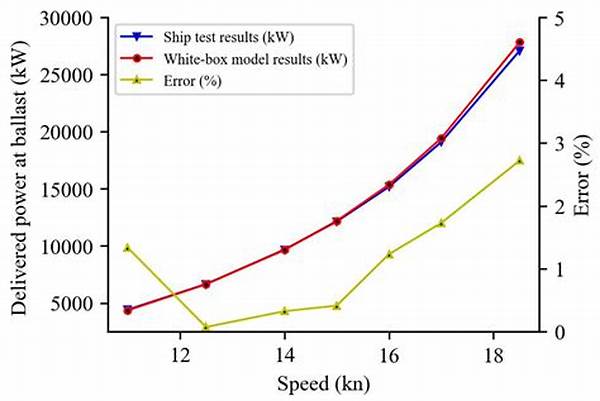
“fuel Consumption Prediction Models”
In today’s fast-paced world, where energy efficiency and environmental sustainability are at the forefront of global priorities, understanding and optimizing fuel consumption is crucial. As carbon emissions continue to rise, the need for efficient fuel consumption prediction models has never been more pressing. These models play a vital role in guiding industries and governments to make informed decisions that contribute to a greener planet. By accurately predicting fuel needs, organizations can minimize waste, reduce costs, and significantly enhance their sustainability efforts. Through advanced algorithms and machine learning, fuel consumption prediction models offer unparalleled precision, enabling entities to embrace a future where energy usage is both economically and ecologically sound. The time to invest in these models is now, as they hold the promise of transforming how we consume energy on a global scale.
Read Now : Electric Motor Braking Systems
The Importance of Fuel Consumption Prediction Models
Fuel consumption prediction models are not just beneficial—they are essential for modern industry and environmental conservation. By leveraging these models, companies can anticipate fuel needs with remarkable accuracy, reducing both unnecessary expenditure and environmental impact. Precision in prediction translates into strategic planning and resource allocation, leading to better energy management. These models empower organizations to preemptively address their fuel requirements, thereby optimizing operations and contributing to sustainability goals. Moreover, adopting fuel consumption prediction models aligns with global efforts to curtail emissions, ensuring compliance with international environmental standards. The reliance on such predictive technology is a step forward towards an era dominated by efficient and responsible fuel use.
Five Key Advantages of Fuel Consumption Prediction Models
1. Cost Efficiency: By utilizing fuel consumption prediction models, organizations can significantly lower operational costs through precise fuel usage planning and waste reduction.
2. Environmental Benefits: These models help in reducing carbon footprints, aligning industrial activities with environmental preservation goals.
3. Increased Operational Efficiency: Predictive models allow for anticipatory measures in fuel supply management, enhancing overall operational efficiency.
4. Strategic Resource Allocation: Accurate fuel predictions ensure optimal resource allocation, preventing both overstock and shortage scenarios.
5. Regulatory Compliance: Fuel consumption prediction models keep organizations in line with changing environmental laws and regulations, avoiding potential legal complications.
Enhancing Efficiency with Fuel Consumption Prediction Models
In the race towards a sustainable future, utilizing fuel consumption prediction models is a game-changer. These models not only forecast fuel requirements with impeccable accuracy but also bring forth a cascade of operational enhancements. In industries where margins are thin, predicting fuel usage accurately can pivot an organization from financial viability to exponential growth. This technological advancement is not just about reducing costs; it’s about transforming operational frameworks to achieve higher efficiency. With these models, businesses aren’t merely reacting to challenges—they’re proactively molding a sustainable future. The integration of fuel consumption prediction models into business strategies signifies a commitment to innovation and excellence.
Read Now : Step-by-step Car Repair Guides
The Science Behind Fuel Consumption Prediction Models
Fuel consumption prediction models operate at the intersection of data science and environmental stewardship. They harness vast amounts of data through machine learning algorithms to create precise consumption forecasts. This high-tech approach reduces human error and adapts continuously to new variables and patterns, thereby optimizing fuel efficiency. By understanding past consumption trends and incorporating emerging data inputs, these models create a dynamic blueprint for fuel management. The application of statistical analysis, along with artificial intelligence, ensures that fuel consumption prediction models remain robust, reliable, and highly effective in a fast-evolving world. They are not just tools—they are a strategic asset for those who aim to lead in sustainable practices.
The Long-Term Benefits of Fuel Consumption Prediction Models
Fuel consumption prediction models hold the key to achieving long-term sustainability in energy management. Over time, these models equip businesses with the ability to streamline their operations, thereby conserving resources and supporting environmental preservation. The implementation of these models paves the way for technologies and practices that minimize waste and encourage efficiency. As businesses gravitate towards greener practices, fuel consumption prediction models will serve as the cornerstone for technological advancements in fuel efficiency. They form the basis for initiatives that promise to transform industries, guiding them towards a more sustainable and economically sound future. By embracing these models, industries can assert their leadership in the global push for sustainability.
The Impact of Fuel Consumption Prediction Models on Innovation
Fuel consumption prediction models are catalysts for innovation. By providing accurate forecasts, they enable companies to innovate with confidence, exploring new methodologies and technologies without the fear of resource mismanagement. This predictive capability fosters a culture of continuous improvement and risk-taking, essential ingredients for breakthrough innovations. As the predictions become more precise, organizations can experiment with alternative fuels and novel technologies, assured of maintaining operational efficiency. Thus, fuel consumption prediction models don’t just support existing frameworks—they expand the horizon for new possibilities, pushing the boundaries of what businesses can achieve in sustainability and innovation.
Summary of Fuel Consumption Prediction Models
In summary, fuel consumption prediction models are revolutionizing how industries manage and consume energy. These models provide crucial insights that enable organizations to align their operations with both economic and environmental goals. With precision and adaptability, they transform challenges into opportunities, allowing businesses to innovate within a framework that supports sustainability. Importantly, these models represent not only a technological advancement but a holistic approach to responsible energy consumption. As industries worldwide recognize the importance of predictive accuracy, fuel consumption prediction models will become indispensable. They are not merely a trend—they are the future of energy management, holding the potential to reshape industries towards lasting sustainability. In a world increasingly aware of its environmental impact, investing in these models is an investment in a responsible and prosperous future.